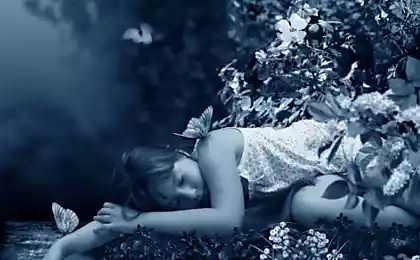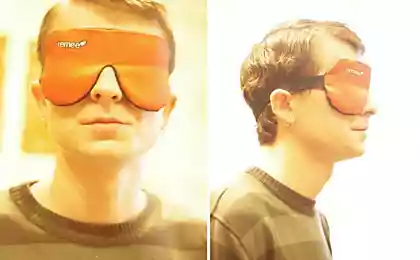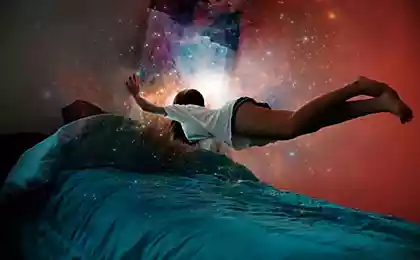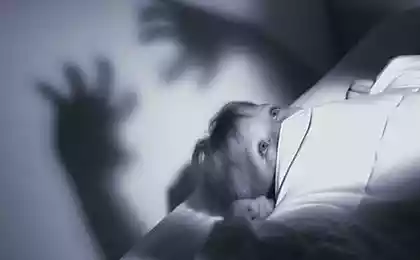418
Why falling asleep, we experience the sensation of falling
Surely you are not just experienced a strange sudden feeling of falling when falling asleep, forcing you to abruptly Wake up. Actually it's not a dream about falling, which happens in deep sleep, according to many people, and instant physical sensation that wakes us, and which is accompanied by a hallucination, not a dream.

To better understand this phenomenon, it is necessary to understand the mechanism of sleep. The dream begins in that part of the brain called the reticular formation sends signals to the spinal cord to the muscle relaxation and suppression of the incentives. The push that you feel when you Wake up, not lifts you up when you sleep, because the body absorbs own consciousness. Everyone agrees with this. But then the opinions of scholars differ. 1. The signal went in the wrong direction One group of scientists noticed that the signal from the reticular formation some people switched. Instead of suppressing the contraction of the muscles, it enhances their reduction to almost any stimulus. In science it is termed "hypnogogic twitching". When a person cringe upon awakening, the sudden change of position without direct support under the hands or feet may cause a person to believe that feeling them this fall. 2. The body is relaxed, and the brain is Other scientists believe that the sensation of falling comes from the relaxation, especially if the person is worried and can not get comfortable. As soon as the muscles relax during sleep, the brain remains awake, watching the situation. Weakness of the muscles and the fact that the person is "settles", is interpreted by the brain as a sudden sensation of falling and the brain is trying to Wake the man. 3. Stress induced hallucinations And what about hallucinations? Despite the fact that I think many people, hallucinations are not something out of the ordinary, and many of us in one way or another, suffered hallucinations. A hallucination is the only experience in which the brain incorrectly interpreterpath some group incentives. For example, you may suddenly feel that you are the corner of my eye I see the cat watching you, and suddenly it turns out that it's actually a pile of garbage near the post. The brain just makes a hasty conclusion and creates a picture that is not entirely true. These hallucinations are aggravated by stress, when the brain is jumping to conclusions, and fatigue when the brain does not handle automatically as much information as it does under other conditions. When you fall asleep, experiencing anxiety, being oversensitive to stimuli and uncomfortable situation leads to the fact that the brain receives a sudden signal of danger (body falls) and seeks out the reason why it falls. It produces drowsiness, which we remember when you Wake up, in which for example you were walking and just slipped.published
Source: www.psychology-age.ru/2013/11/blog-post_3270.html

To better understand this phenomenon, it is necessary to understand the mechanism of sleep. The dream begins in that part of the brain called the reticular formation sends signals to the spinal cord to the muscle relaxation and suppression of the incentives. The push that you feel when you Wake up, not lifts you up when you sleep, because the body absorbs own consciousness. Everyone agrees with this. But then the opinions of scholars differ. 1. The signal went in the wrong direction One group of scientists noticed that the signal from the reticular formation some people switched. Instead of suppressing the contraction of the muscles, it enhances their reduction to almost any stimulus. In science it is termed "hypnogogic twitching". When a person cringe upon awakening, the sudden change of position without direct support under the hands or feet may cause a person to believe that feeling them this fall. 2. The body is relaxed, and the brain is Other scientists believe that the sensation of falling comes from the relaxation, especially if the person is worried and can not get comfortable. As soon as the muscles relax during sleep, the brain remains awake, watching the situation. Weakness of the muscles and the fact that the person is "settles", is interpreted by the brain as a sudden sensation of falling and the brain is trying to Wake the man. 3. Stress induced hallucinations And what about hallucinations? Despite the fact that I think many people, hallucinations are not something out of the ordinary, and many of us in one way or another, suffered hallucinations. A hallucination is the only experience in which the brain incorrectly interpreterpath some group incentives. For example, you may suddenly feel that you are the corner of my eye I see the cat watching you, and suddenly it turns out that it's actually a pile of garbage near the post. The brain just makes a hasty conclusion and creates a picture that is not entirely true. These hallucinations are aggravated by stress, when the brain is jumping to conclusions, and fatigue when the brain does not handle automatically as much information as it does under other conditions. When you fall asleep, experiencing anxiety, being oversensitive to stimuli and uncomfortable situation leads to the fact that the brain receives a sudden signal of danger (body falls) and seeks out the reason why it falls. It produces drowsiness, which we remember when you Wake up, in which for example you were walking and just slipped.published
Source: www.psychology-age.ru/2013/11/blog-post_3270.html























